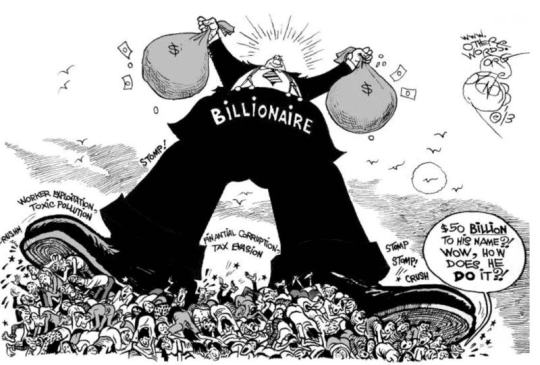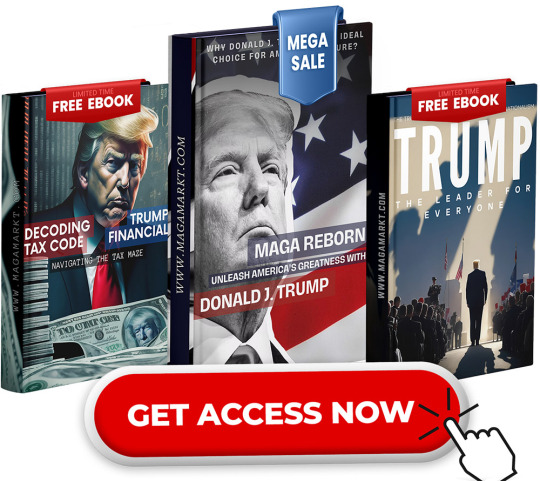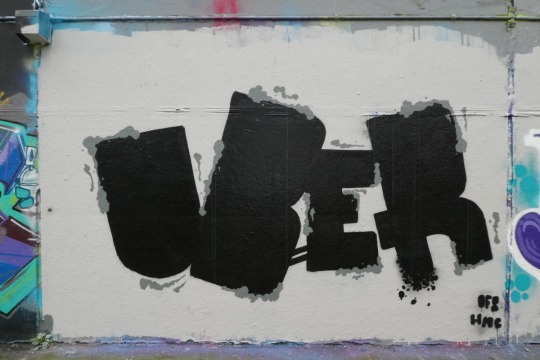#Political Influence
Text

The real choice isn’t “pragmatism” or “idealism.” It’s either allowing these trends to worsen – destroying what’s left of our democracy and turning our economy into even more of a playground for big corporations, Wall Street, and billionaires – or reversing them. And the only pragmatic way of reversing them is through a “political revolution” that mobilizes millions of Americans.
Robert Reich (via azspot)
+
LETTERS FROM AN AMERICAN
HEATHER COX RICHARDSON
MAR 2, 2024
On February 25, 1901, financier J. P. Morgan’s men filed the paperwork to incorporate a new iron and steel trust, and over the weekend, businessmen waited to see what was coming. Five days later, on March 2, the announcement came: J. P. Morgan was overseeing the combination of companies that produced two thirds of the nation’s steel into the United States Steel Corporation. It was capitalized at $1.4 billion, which at the time was almost three times more than the federal government’s annual budget.
While the stock market was abuzz with news of the nation’s first billion-dollar corporation, Vice President–elect Theodore Roosevelt was on his way from New York to Washington, D.C., where he and his family arrived at 5:00 in the evening. The train was an hour behind schedule because the crowds coming to see the upcoming inauguration, scheduled for Monday, March 4, 1901, had slowed travel into Washington.
Two days later, President William McKinley took the oath of office for the second time, and Roosevelt became vice president.
McKinley was a champion of big business and believed the role of government was to support industry, dismissing growing demands from workers, farmers, and entrepreneurs for the government to level the economic playing field that had tilted so extraordinarily toward a few industry leaders. McKinley had won the hard-fought election of 1896 handily, but by 1900, Republicans were so concerned about the growing demand for reform that party leaders put Roosevelt, who had won a reputation for standing up to business interests, on the ticket, at least in part because they hoped to silence him there.
Roosevelt hoped he could promote reform from the vice presidency, but he quickly discovered that he couldn’t accomplish much of anything. His only official duty was to preside over the Senate, which would not convene until December. He was so bored he asked the chief justice of the Supreme Court if it would be unseemly for him to enroll in law school to finish his degree. (Horrified, the justice offered to supervise Roosevelt’s studies himself.)
But then, in September, an unemployed steelworker assassinated McKinley, and Roosevelt became president. “I told McKinley it was a mistake to nominate that wild man at Philadelphia,” one of McKinley’s aides said. “I told him what would happen if he should die. Now look. That damned cowboy is president of the United States.”
Two months later, on November 13, J. P. Morgan and railroad magnates brought together the nation’s main railroad interests, which had been warring with each other, into a new conglomerate called the Northern Securities Company. Even the staunchly big business Chicago Tribune was taken aback: “Never have interests so enormous been brought under one management,” its editor wrote.
Midwestern governors, whose constituents depended on the railroads to get their crops to market, suggested that their legislatures would find a way to prohibit such a powerful combination. Northern Securities Company officials retorted that they would simply keep all business transactions and operations secret. When Roosevelt gave his first message to Congress in December, industrialists watched to see what the “damned cowboy” would say about their power over the government.
They were relieved. Roosevelt said the government should start cleaning up factories and limiting the working hours of women and children, and that it should reserve natural resources for everyone rather than allow them to be exploited by greedy businessmen.
But Roosevelt did not oppose the new huge combinations. He simply wanted the government to supervise and control corporate combinations, preventing criminality in the business world as it did in the streets. He asked businessmen only for transparency. Once the government actually knew what businesses were up to, he said, it could consider regulation or taxation to protect the public interest.
Senators and businessmen who had worried that the cowboy president would slash at the trusts breathed a sigh of relief that all he wanted was “transparency.” According to the Chicago Tribune, the “grave and reverend and somewhat plutocratic Senators immediately admitted in the most delighted fashion that the young and supposedly impetuous President had discussed the trust question with rare discrimination.”
But they were wrong to think Roosevelt did not intend to reduce the power of big business. In early January 1902, Minnesota sued to stop the Northern Securities Company from organizing on the grounds that such a combination violated Minnesota law. While the Supreme Court dithered over whether or not it could rule on the case, the Roosevelt administration put the federal government out in front of the issue. In February, Roosevelt’s attorney general told newspapers that the administration believed the formation of the Northern Securities Company violated the 1890 Sherman Antitrust Act and that he would be filing a suit to keep it from organizing.
Businessmen were aghast, not only because Roosevelt was going after a business combination but also because he had acted without consulting Wall Street. When J. P. Morgan complained that he had not been informed, Roosevelt coolly told him that that was the whole point. “If we have done anything wrong,” said the astonished Morgan, “send your man [the attorney general] to my man [one of his lawyers] and they can fix it up.” The president declined. “We don’t want to fix it up,” explained the attorney general. “We want to stop it.”
“Criticism of President Roosevelt’s action was heard on every side,” reported the Boston Globe. “Some of the principal financiers said he had dealt a serious blow to the financial securities of the country.” For his part, Roosevelt was unconcerned by the criticism. “If the law has not been violated,” he announced, “no harm can come from the proposed legal action.”
In late February, the Supreme Court decided it would not hear the Minnesota case; on March 10, the United States sued to stop the organization of the Northern Securities Company.
In August 1902, Roosevelt toured New England and the Midwest to rally support for his attack on the Northern Securities Company. He told audiences that he was not trying to destroy corporations but rather wanted to make them act in the public interest. He demanded a “square deal” for everyone. As the Boston Globe put it: “‘Justice for all alike—a square deal for every man, great or small, rich or poor,’ is the Roosevelt ideal to be attained by the framing and the administration of the law. And he would tell you that that means Mr Morgan and Mr Rockefeller [sic] as well as the poor fellow who cannot pay his rent.”
In 1904 the Supreme Court ruled that the Northern Securities Company was an illegal monopoly and that it must be dissolved, and by 1912, Roosevelt had come to believe that a strong federal government was the only way for citizens to maintain control over corporations, which he saw as the inevitable outcome of the industrial economy. He had no patience for those who hoped to stop such combinations by passing laws against them. Instead, he believed the American people must create a strong federal government that could exert public control over corporations.
In a famous speech at Osawatomie, Kansas, in 1912, he called for a “new nationalism.”
“The citizens of the United States must effectively control the mighty commercial forces which they have called into being,” he said. He warned that “[t]here can be no effective control of corporations while their political activity remains…. We must have complete and effective publicity of corporate affairs, so that the people may know…whether the corporations obey the law and whether their management entitles them to the confidence of the public.”
Roosevelt had come to believe that a strong government must regulate business. “The absence of effective State, and, especially, national, restraint upon unfair money-getting has tended to create a small class of enormously wealthy and economically powerful men, whose chief object is to hold and increase their power,” he said.
After all, he said, “[t]he object of government is the welfare of the people.”
LETTERS FROM AN AMERICAN
HEATHER COX RICHARDSON
#Heather Cox Richardson#letters From an American#history#T.Roosevelt#bllionaires#corporate greed#income inequality#democracy#political influence#American History#Robert Reich#the purchase of the SCOTUS#welfare of the people
13 notes
·
View notes
Text
youtube
0 notes
Text
What's the difference between legitimate and illegitimate means of political influence?
"Going Dark: The Secret Social Lives of Extremists" - Julia Ebner
#book quote#going dark#julia ebner#nonfiction#questions#what's the difference#legitimacy#legitimate#illegitimate#political influence
0 notes
Text
Debunking DAVOS Conspiracies
youtube
A humorous report and analysis of DAVOS 2024.
0 notes
Text
"We the People!" - 03/21/2024
Our leaders are failing us, and too many of us are either unaware of what’s going on behind the proverbial curtain hiding the levers of fiduciary power and political influence, or of those of us who can see behind that curtain lack the courage to fight it.
The key players in the major political and financial factions need to be influenced in more positive ways as well as putting them in a position to either move in the direction of freedom with responsibility or allow them to fall by the wayside by virtue of a massive, rational revolt of non-compliance by “we the people!”
P.S. Vote for Donald J. Trump this November 5th.
#we the people#political influence#fiduciary power#political#fiduciary#freedom#non-compliance#rational revolt#donald j trump#trump#donald trump#our leaders#leaders
0 notes
Text
THE TRUMP TRILOGY IS HERE!
RECLAIM AMERICA’S ESSENCE WITH MAGAMARKT’S EXCLUSIVE OFFER. IMMERSE IN THE DIGITAL TRILOGY, REDISCOVER PATRIOTIC SPIRIT, AND JOIN A COMMUNITY UNITED TO RECLAIM THE HEART OF THE NATION. THIS IS MORE THAN KNOWLEDGE, IT’S A PATRIOTIC JOURNEY WORTH SEIZING!OBTAIN THE TRUMP TRILOGY & THE TRUTHFUL NEWS SUBSCRIPTION AND ENJOY THE FREE BONUS, ALL FOR JUST $5 AND ENJOY A 7-DAY ACCESS. ONCE YOUR TRIAL…

View On WordPress
#American Narrative#American Politics#Conservatism#Contemporary Politics#Electoral Campaigns#Electoral Strategy#Political Analysis#Political Biographies#Political Influence#Political Leadership#Political Memoirs#Presidential History#Presidential Speeches#Public Figures#Republican Party#Trump Administration#Trump Collection#Trump&039;s Legacy.#US Elections#US Government
0 notes
Link
Join us in celebrating the spirit of resilience and unity at the Dominican Independence Day Breakfast! 🎉 Discover how this significant event showcases the cultural contributions, economic impact, and growing political influence of the Dominican community. A heartwarming reflection of progress, unity, and empowerment. Don’t miss out on this vibrant celebration! #DominicanIndependenceDay
0 notes
Link
Unravelling narrative
#Canada#NaziGate#scandal#conspiracy#deception#immigration#ratlines#historical revisionism#secret societies#political influence#corruption
1 note
·
View note
Text
Beyond the Numbers: Reconsidering the Purpose of Writing and Social Media Goals
Pixabay
In today’s social media-driven world, it’s easy to get caught up in the pursuit of likes, followers, and other metrics that supposedly measure our success online. Many aspiring writers, bloggers, and content creators set goals for themselves, whether it’s reaching 100 followers or gaining a certain number of likes on their posts. However, as we focus on these numbers, it’s important to…

View On WordPress
#effective strategy#marketing methods#potential customers#target audience#web traffic#100 Followers#Fake influencers#Follow#Followers#numbers#political influence#Social Media#Tips And Tricks
0 notes
Text
"Power to The People" - How to Retake Our Country from Corruption and Dark Money
The issue of money in politics has long been a concern for American citizens, who worry that wealthy donors and special interest groups hold undue influence over our elected officials. This concern has only grown in recent years, as the flood of dark money into politics has made it increasingly difficult for ordinary citizens to have their voices heard.
Despite these challenges, there are steps that we can take to retake our country from corruption and dark money and ensure that our democracy remains strong and vibrant. Here are some key strategies that can help to put power back in the hands of the people:
Push for campaign finance reform: One of the most effective ways to limit the influence of dark money in politics is to advocate for campaign finance reform. This might include measures such as public financing of political campaigns, tighter disclosure requirements for political donations, and stronger enforcement of campaign finance laws.
Support candidates who refuse dark money: Another way to combat the influence of dark money is to support political candidates who refuse to accept contributions from wealthy donors and special interest groups. By electing officials who are committed to transparency and who prioritize the needs of their constituents over the interests of wealthy donors, we can help to restore faith in our democratic institutions.
Engage in grassroots activism: Grassroots activism can be a powerful tool for bringing attention to issues related to corruption and dark money in politics. This might include organizing protests, creating social media campaigns, or engaging in community outreach and education.
Educate yourself and others: Finally, it's important to stay informed about the issues related to money in politics and to educate others about these issues. By spreading awareness and engaging in dialogue, we can help to build a movement for change and create a more informed and engaged citizenry.
Ultimately, the fight against corruption and dark money in politics is a long and difficult one. However, by working together and staying committed to our democratic values, we can retake our country from those who seek to undermine our democratic institutions and ensure that power remains in the hands of the people.
#campaign finance reform#grassroots activism#dark money#corruption#political donations#democracy#political influence#political transparency#political candidates#American politics
0 notes
Text
Unpacking Trump's Latest Claim: What It Reveals About His Hold on Politics and the 2024 Election
Is that Trump got arrested?
Former President Donald Trump’s recent claim that he would be arrested before the 2024 election, if the Democrats win, sheds light on his continued hold on politics. Trump’s supporters remain fiercely loyal to him, even after the Capitol riot and his second impeachment trial. His claims of election fraud have also kept his base energized and loyal to him.
Trump’s recent remarks are part of a…

View On WordPress
#2024 election#accountability#Capitol riot#Donald Trump#election fraud#GOP leadership#political influence#Republican Party#US politics
0 notes
Text
Irish-uwufication is so fucking weird anyway but like people act like Hozier - who writes primarily blues songs about politics, books and music he finds interesting, and having sex with hot women he picks up in bars - is just a nature man is so weird. Like you have Americans saying he is a bog man, he only writes acoustic songs about chaste love and nature. He lives in the woods and doesn’t interact with society at all. He is made of trees and fairies because that’s what Ireland is.
#saw a tiktok and got passionate#so many Irish poets get this treatment too it’s weird#hozier#andrew hozier byrne#Hozier writes about politics all the time#he has an entire song based on albums he likes#not to mention he talks all the time about how influenced he is by black blues singers and rhythm guitarists not white acoustic guys#zee rambles
7K notes
·
View notes
Text
That's some impressive turnarounding.
"Zealot: A Book About Cults" - Jo Thornely
#book quote#zealot#jo thornely#nonfiction#jim jones#the peoples temple#cult#jonestown#social influence#political influence
0 notes
Text
If all allegations disturb a thought to conclude if we allow stated clauses to end delayed words of political leaders . Words is the conversation that allows dreams as words to rethink creative control as we describe in agony . Politics is a question to end a primary talk to converse if talks is a directive negotiable word that escalated words that can decide errors in a argument of war . We direct views in a question which is emotion of budgets that threat to collide as a decision that matters.

0 notes
Text
Uber and the political economy problem
The Uber Files tell us that the big problem with Uber is also a problem with our political elites.
Obviously the Uber Files, published by the Guardian and other media organisations, didn’t tell us that much that we didn’t know from news reports down the years, especially of the years when Travis Kalanick was the CEO. But it helps us to think about Uber in a different way: as a problem of political economy.
Uber was a sociopathic company awash with venture capital dollars that operated at and…

View On WordPress
0 notes